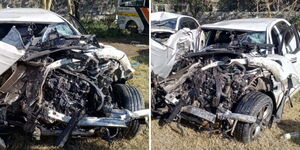There has been a growing trend of Kenyans burning their national documents out of frustration.
Notable cases include when a presidential aspirant on June 6, 2022, burned his voter’s card after being denied clearance to vie and a university graduate who, on Saturday, June 10, went viral after setting his academic certificates ablaze.
Speaking to Kenyans.co.ke, Dr Brian Mutie, an Advocate of the High Court, warned Kenyans that they can find themselves in prison for destroying government-issued documents.
Mutie, a governance expert with over 15 years of experience, explained that the law in particular detailed fines and jail terms for those who were caught destroying national identity cards and passports.
“There is no single law which addresses the issue of destruction of statutory documents.
“When it comes to IDs, the Registration of Persons Act Cap 107 does not explicitly address self-destruction of documents but Section 14 of the Act under Subsection J(iii) explains mutilation of ID cards,” the veteran lawyer told Kenyans.co.ke.
The law states, “Any person who forges or mutilates an identity card shall be guilty of an offence and liable to a fine not exceeding fifteen thousand shillings or to imprisonment for a term not exceeding eighteen months or to both.”
Mutie further revealed that under the Kenya Citizenship and Immigration Act, an individual risked paying Ksh5 million in fines for destroying their passport.
A Kenyan or a foreigner also risked arrest for destroying a visa, work permit or any other formal document issued by the State Department of Immigration.
Under Section 54 of the Act, the law states, “Any person who forges, alters, destroys or wilfully defaces a passport, travel document, certificate of registration, visa, work permit, residence permit, pass, written authority, consent or approval upon conviction shall be liable to a fine not exceeding five million shillings or to imprisonment for a term not exceeding five years or to both.”
On academic certificates, Mutie clarified that there was no explicit law under the Kenyan Constitution that regulated the destruction of the crucial document.
“There are laws set by Kenya National Examinations Act and Council of University of Education over academic practices.
“Unfortunately, the offences detailed concern the integrity of examinations but there is no provision for those who would decide to burn their academic certificates,” he explained.
Dr Brian Mutie noted that going forward, there is a need to enact a law to address the issue.
“For example, the Accountants Act Section 42(b) details a fine for anyone who willingly damages examination material but does not talk about the destruction of the certificate,” he explained the gap in the law.












